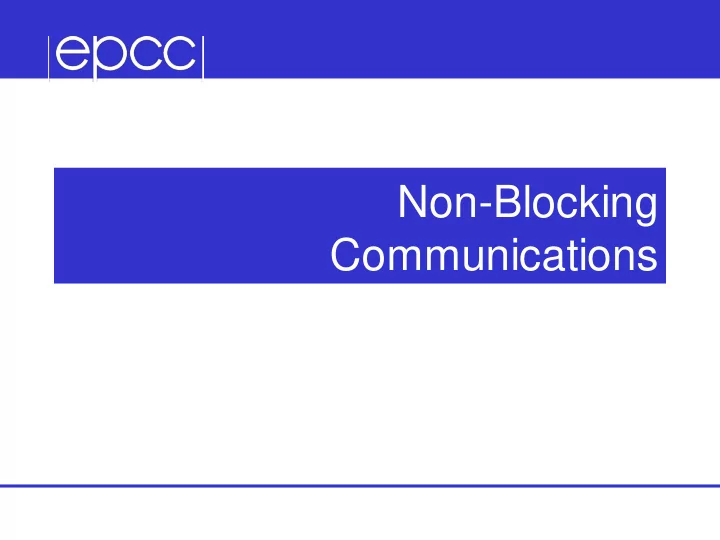

Non-Blocking Communications
Deadlock 1 2 5 3 4 0 Communicator
Completion The mode of a communication determines when its constituent operations complete. – i.e. synchronous / asynchronous The form of an operation determines when the procedure implementing that operation will return – i.e. when control is returned to the user program
Blocking Operations Relate to when the operation has completed. Only return from the subroutine call when the operation has completed. These are the routines you used thus far – MPI_Ssend – MPI_Recv
Non-Blocking Operations Return straight away and allow the sub-program to continue to perform other work. At some later time the sub-program can test or wait for the completion of the non-blocking operation. Beep!
Non-Blocking Operations All non-blocking operations should have matching wait operations. Some systems cannot free resources until wait has been called. A non-blocking operation immediately followed by a matching wait is equivalent to a blocking operation. Non-blocking operations are not the same as sequential subroutine calls as the operation continues after the call has returned.
Non-Blocking Communications Separate communication into three phases: Initiate non-blocking communication. Do some work (perhaps involving other communications?) Wait for non-blocking communication to complete.
Non-Blocking Send 1 2 5 3 4 0 Communicator
Non-Blocking Receive 1 2 5 3 4 0 Communicator
Handles used for Non-blocking Comms datatype same as for blocking ( MPI_Datatype or INTEGER ). communicator same as for blocking ( MPI_Comm or INTEGER ). request MPI_Request or INTEGER . A request handle is allocated when a communication is initiated.
Non-blocking Synchronous Send C: int MPI_Issend(void* buf, int count, MPI_Datatype datatype, int dest, int tag, MPI_Comm comm, MPI_Request *request) int MPI_Wait(MPI_Request *request, MPI_Status *status) Fortran: MPI_ISSEND(buf, count, datatype, dest, tag, comm, request, ierror) MPI_WAIT(request, status, ierror)
Non-blocking Receive C: int MPI_Irecv(void* buf, int count, MPI_Datatype datatype, int src, int tag, MPI_Comm comm, MPI_Request *request) int MPI_Wait(MPI_Request *request, MPI_Status *status) Fortran: MPI_IRECV(buf, count, datatype, src, tag, comm, request, ierror) MPI_WAIT(request, status, ierror)
Blocking and Non-Blocking Send and receive can be blocking or non- blocking. A blocking send can be used with a non- blocking receive, and vice-versa. Non-blocking sends can use any mode - synchronous, buffered, standard, or ready. Synchronous mode affects completion, not initiation.
Communication Modes NON-BLOCKING OPERATION MPI CALL Standard send MPI_ISEND Synchronous send MPI_ISSEND Buffered send MPI_IBSEND Ready send MPI_IRSEND Receive MPI_IRECV
Completion Waiting versus Testing. C: int MPI_Wait(MPI_Request *request, MPI_Status *status) int MPI_Test(MPI_Request *request, int *flag, MPI_Status *status) Fortran: MPI_WAIT(handle, status, ierror) MPI_TEST(handle, flag, status, ierror)
Multiple Communications Test or wait for completion of one message. Test or wait for completion of all messages. Test or wait for completion of as many messages as possible.
Testing Multiple Non-Blocking Comms Process in in in
Combined Send and Receive Specify all send / receive arguments in one call – MPI implementation avoids deadlock – useful in simple pairwise communications patterns, but not as generally applicable as non-blocking int MPI_Sendrecv(void *sendbuf, int sendcount, MPI_Datatype sendtype, int dest, int sendtag, void *recvbuf, int recvcount, MPI_Datatype recvtype, int source, int recvtag, MPI_Comm comm, MPI_Status *status); MPI_SENDRECV(sendbuf, sendcount, sendtype, dest, sendtag, recvbuf, recvcount, recvtype, source, recvtag, comm, status, ierror)
Exercise Rotating information around a ring See Exercise 4 on the sheet Arrange processes to communicate round a ring. Each process stores a copy of its rank in an integer variable. Each process communicates this value to its right neighbour, and receives a value from its left neighbour. Each process computes the sum of all the values received. Repeat for the number of processes involved and print out the sum stored at each process.
Possible solutions Non-blocking send to forward neighbour – blocking receive from backward neighbour – wait for forward send to complete Non-blocking receive from backward neighbour – blocking send to forward neighbour – wait for backward receive to complete Non-blocking send to forward neighbour Non-blocking receive from backward neighbour – wait for forward send to complete – wait for backward receive to complete
Notes Your neighbours do not change – send to left, receive from right, send to left, receive from right, … You do not alter the data you receive – receive it – add it to you running total – pass the data unchanged along the ring You must not access send or receive buffers until communications are complete – cannot read from a receive buffer until after a wait on irecv – cannot overwrite a send buffer until after a wait on issend
Recommend
More recommend